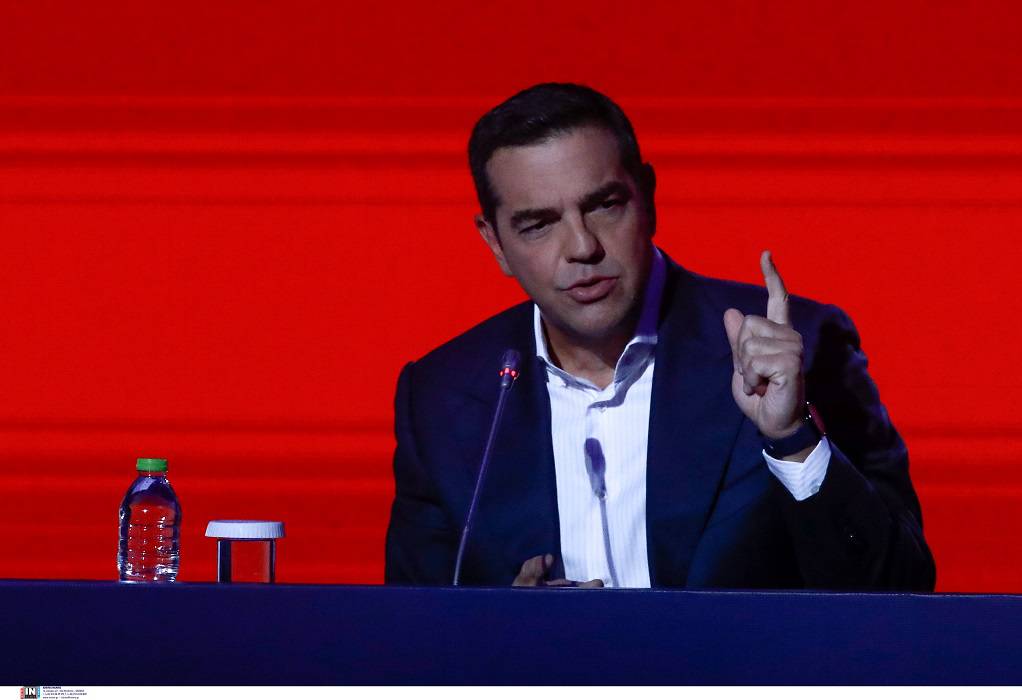By George Gilson
Main opposition SYRIZA leader, in a major news conference at the Thessaloniki International Fai (TIF) today, ruled out acceptance of a minority government and he also rejected the prospect of a four -party coalition with PASOK, MeRA 25 (led by former SYRIZA finance minister Yanis Varoufakis), and the KKE Greek Communist Party, except in the unlikely prospect that SYRIZA emerges as the top party in the next general election.
Though SYRIZA still trails New Democracy by about eight percentage points in the latest opinion surveys, all polls indicate that the ruling party will not be able to garner enough support to secure a parliamentary majority, and both Tsipras and Prime Minister Kyriakos Mitsotakis, despite declarations of pious wishes to the contrary, take for granted that a second general election will be necessary.
Parties face tortuous decisions on who they will side with in prospective coalition
Over the last many months, the political debate has focused on possible alliances for a viable coalition government to be formed after the next election, as the proportional representation electoral law passed by the former SYRIZA government makes it nearly impossible for the top party to garner a parliamentary majority and secure single-party rule.
Until the revelations about the National Service (EYP), which is under the direct jurisdiction of the PM, having surveilled PASOK leader Nikos Androulakis, New Democracy was pinning its hopes on a strong ND-PASOK coalition, but that has been thrown into doubt, to say the least, after the political maelstrom over EYP’s spying on Androulakis, though it cannot be ruled out entirely, depending on the political balances that emerge after the first election.
Tsipras: paramount goal is SYRIZA emerging as top party
Tsipras justified his rejection of a minority or “tolerance” government, that would agree to the rule of the top party by either supporting or without voting down its legislation, depending on the bill, or of a four-party government without ND even if it the ruling party finishes first, on the grounds that his sole aim is for SYRIZA to be the top party in the first election so as to form a “progressive, centre left government”.
Tsipras has been cautiously courting Androulakis long before the surveillance scandal broke out.
Tsipras said that if his objective proves unfeasible, a second general election is unavoidable.
Mitsotakis’ poses aggressive dilemma to voters: mandate for New Democracy or ‘catastrophe’
In arguing that only New Democracy securing a parliamentary majority can guarantee the formation of a stable government, Mitsotakis at his 11 September press conference at TIF had raised the bogey that otherwise there is a prospect [which in fact is well nigh impossible] that a SYRIZA-PASOK-MeRA 25-KKE Greek Communist Party coalition could be formed, even if SYRIZA finishes second in the election, a prospect that he described as a political “teratogenesis” (or creation of a “monster”, deriving from the biological term for serial foetal birth defects).
The KKE now, as always, vehemently rules out its participation in any coalition government.
Mitsotakis went as far as to declare to voters that if they do not give New Democracy a fresh mandate the country will face a “catastrophe”.
The PM argued that New Democracy’s programme is clear to voters, whereas Tsipras’ declarations regarding the formation of a “progressive” government is nebulous and platitudinous and that voters cannot truly know in advance what is in store for them under a SYRIZA government.
Androulakis draws audacious ‘red line’, with provisos
For his part, Androulakis is playing his cards close to his vest, and has not categorically ruled out joining a coalition government with the participation of ND and SYRIZA, though he has for the time being set as a red line that neither Mitsotakis nor Tsipras serve as prime minister, clearly an audacious demand for a third party.
The PASOK-KINAL leader has said that he refuses to discuss coalition scenarios until the political balances from the first general election become apparent.
PASOK’s electoral support will determine nature of coalition
Androulakis has stressed that he is seeking a strong mandate in the first election so that his party can set terms for the formation of a government whose programme will be tinged with a strong element of social democracy.
That would appear to indicate that he conceivably will be willing to join a coalition with ND if his party will have a strong input in the government’s programme.
Naturally, the degree of his leverage in that case would depend on the strength of his party’s electoral results, and he has repeatedly made that clear to voters.
Who will lead coalition government?
It is in that context that he maintains that if ND and SYRIZA have a poor electoral showing, he will not consent to either party’s leader serving as prime minister, which means there would have to be an agreement between the coalition partners on the individual who will lead the government.
There is practically no chance that either Mitsotakis or Tsipras would agree to that.
Tsipras insists on formation of ‘progressive government’ with win in first election
When asked at today’s news conference whether Androulakis’ red line will be an obstacle to the formation of a progressive government, Tsipras replied, “We have a single objective in mind – to form a progressive government with broad popular legitimisation.”
Tsipras wants to avoid second election, says people will decide who will be PM
SYRIZA’s leader said he respects PASOK’s desire for autonomy, suggesting that the centre-left party could preserve its autonomy in a coalition while setting demands regarding the government’s programme.
He also noted that he aim at formation of a government after the first election, without the need to hold a second one.
Yet, he flatly rejected Androulakis position regarding who will serve as prime minister, asserting that only the Greek people with their vote can determine that, a view that echoed that of the PM.
Referring to the surveillance affair, Tsipras said he does not believe Androulakis will collaborate with those who were spying on him – which he described as a cooperation of “the perpetrator with the victim”.
Still, Androulakis has tacitly made clear that the surveillance affair will not be a top criterion in choosing his alliances.




